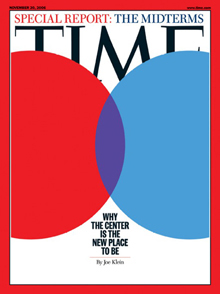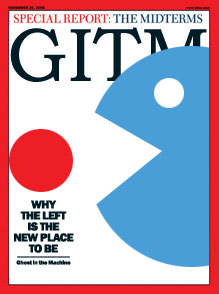em>”Novak may choose to regret or not regret that he blew the cover of an undercover CIA employee; he would hardly be the first journalist to do so. But for Novak to continue pretending he did no such thing is just weird.” Slate‘s Tim Noah explains why Bob Novak is guilty of outing Valerie Plame, even if the DoL tends to suggest otherwise.
Tag: Media
A Libby Alibi?
As Scooter Libby’s defense begins in Washington, a slew of reporters — including Bob Woodward, Bob Novak, and Evan Thomas — testify that Libby was not their source in the Plamegate fiasco, with Novak pinning the onus on Karl Rove (and the previously-outed Richard Armitage.) Hmm. Good to know, but whether Libby was the only White House official throwing around Wilson’s name or merely one of a team of Dubya flaks doing the same seems incidental to the question of whether he perjured himself.
Breaking News.
Anna Nicole Smith died after what looks to be a casino bender, and, just in time for Valentine’s Day, Houston has a problem with crazy-jilted astronauts. I have very little to say about either of these stories, but since they feverishly consumed most of this week’s news cycles, here they are.
Beat the Press?
“The defense has two ways to negate Russert’s powerful testimony: 1) They can say his memory’s bad. They’ve tried, with mixed results. 2) They can say he’s lying. But then they need to show a motive to lie. If fear of embarrassment is the best they’ve come up with, I think they’re in trouble.” The prosecution rests in the Scooter Libby trial, after a two-day appearance by — and defense grilling of — NBC’s Tim Russert.
Simon Says.
“Thematically, it’s about the very simple idea that, in this Postmodern world of ours, human beings — all of us — are worth less. We’re worth less every day, despite the fact that some of us are achieving more and more. It’s the triumph of capitalism…The show is written in a 21st-century city-state that is incredibly bureaucratic, and in which a legal pursuit of an unenforceable prohibition has created great absurdity.“
Slate publishes a fascinating extended interview with Wire creator David Simon, which touches on, among other things, why there won’t be a Season 6 focusing on Latino immigrants, and what we can expect from Season 5. “Yes, the last season. The last theme is basically asking the question, why aren’t we paying attention? If we got everything right in the last four seasons in depicting this city-state, how is it that these problems — which have been attendant problems regardless of who is in power — how is it that they endure? That brings into mind one last institution, which is the media. What are we paying attention to?” I can’t say it enough — if you’re not paying attention to The Wire, you owe it to yourself to rent Season 1 and start playing catch-up next to immediately. It really is far and away the best show on television, perhaps ever. Certainly, it’s the savviest take on American politics ever put to the small screen.
Middle of the Road?


Bradley Signs Off.
“He was this gentle giant,” said Bob Schieffer, CBS’s chief Washington correspondent and a close friend…”He was a great role model.” Ed Bradley, 1941-2006.
FOX fire.
“Alas, poor Brit, it was too much for him to bear in the end, I’m afraid. You almost had to feel sorry for the guy…I said almost.” Salon‘s Andrew O’Hehir evaluates last night’s election coverage on FOX News. I admit, I also switched over to FOX in the late hours just to revel in all the sweet, sweet schadenfreude. I’m forced to concede, though, that their graphics were much better than CNN’s — you could actually tell how many House seats Dems were picking up all night over the needed 15, while CNN dropped that ball as soon as the Senate got tight. At any rate, for angry right-wing teeth-gnashing, nothing on FOX topped Stephen Colbert’s hilarious speel last night at the end of the otherwise middling Midterm Midtacular (Click on “Stephen Quits,” in case you missed it.)
State of Denial?
“What’s maddening is the way Woodward reverses his point of view without acknowledging he ever had one — then or now. You could charge him with flattering politicians only when they’re up, and piling on when they’re down. But you might as well accuse a weathervane of changing its mind about which way the wind should blow.” Slate‘s Jacob Weisberg examines Bob Woodward’s treatment of Donald Rumsfeld through his three Dubya books (most recently State of Denial) and finds him a fickle beast at best.
Feral Lapdog?
“The disclosures so far have been devastating. The book paints the administration as clueless, dishonest, and dysfunctional.”” Slate‘s John Dickerson surveys the likely political impact of Bob Woodward’s State of Denial, which broke today (in the NYT, strangely enough) and which is apparently much more critical of the neocons than his last two puff pieces, Plan of Attack and Bush at War. Of course, we’ve all known that the Dubya White House is chock-full of scheming, untrustworthy, incompetent loons for years now, but apparently, when Bob Woodward finally figures it out, it’s suddenly newsworthy. Oh well, I’ll take it.

